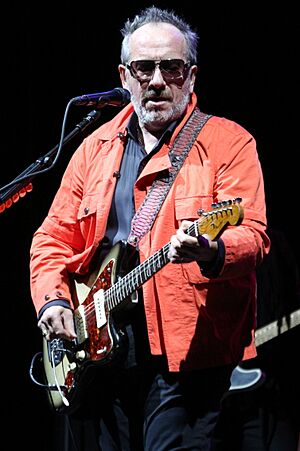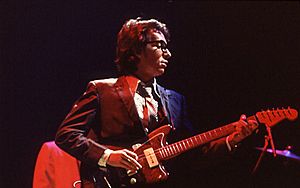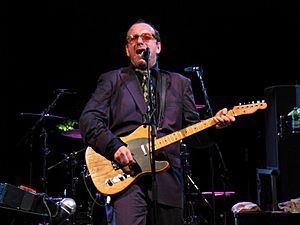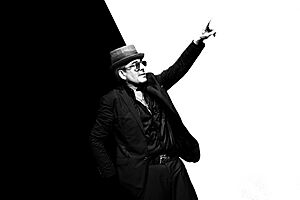Elvis Costello facts for kids
Quick facts for kids
Elvis Costello
|
|
|---|---|

Costello in 2021
|
|
| Background information | |
| Birth name | Declan Patrick MacManus |
| Also known as |
|
| Born | 25 August 1954 London, England |
| Genres | |
| Occupation(s) |
|
| Instruments |
|
| Years active | 1970–present |
| Labels |
|
| Signature | |
 |
|
Declan Patrick MacManus (born 25 August 1954), who is known by his stage name Elvis Costello, is a famous English singer, songwriter, and musician. He is known for his clever lyrics and for mixing different music styles. He combined the smart songwriting of artists like Bob Dylan with the energy of punk rock.
His first album, My Aim Is True (1977), included one of his most famous songs, "Alison". His next two albums, This Year's Model (1978) and Armed Forces (1979), were recorded with his band, the Attractions. These albums helped create the sound of new wave. His biggest hit single in the United Kingdom was "Oliver's Army" in 1979.
Over his long career, Costello has explored many types of music, including country, jazz, and even classical music. He has worked with many famous artists, including Paul McCartney, Burt Bacharach, and the hip-hop group the Roots. Costello has won two Grammy Awards and was added to the Rock and Roll Hall of Fame in 2003.
Contents
Early Life and Musical Beginnings
Elvis Costello was born Declan Patrick MacManus on August 25, 1954, in London, England. He grew up in a home filled with music. His mother, Lillian, worked in a record shop, and his father, Ross MacManus, was a professional jazz musician and singer. Both of his parents were from the Liverpool area.
A Musical Family
Costello's father, Ross, was a trumpet player and singer in the Joe Loss Orchestra, a popular British big band. Ross had to learn many hit songs for the band's radio show. He would bring home records of these songs, which gave young Costello a huge collection of music to listen to. Costello has said, "That's why I know so many songs."
His parents encouraged his interest in music but never forced him to take lessons. He loved listening to a wide variety of music, from pop and jazz to the Beatles, who became his biggest influence. As a teenager, he also enjoyed Motown artists, the Kinks, and the Who.
Learning to Be a Musician
Costello lived in London until he was 16, then moved to Liverpool with his mother after his parents separated. He taught himself to play guitar and began writing songs around age 14. He performed at local folk clubs to practice in front of an audience.
After finishing school, he took a job as a computer operator. This job had a lot of downtime, which gave him the chance to write songs while at work. He continued this job until just before his first album was released in 1977.
In the early 1970s, he played in bands like Rusty and Flip City. These bands played in pubs and clubs, performing a mix of Costello's original songs and covers. This experience helped him develop his skills as a performer and songwriter.
Career Breakthrough
In 1976, Costello sent a demo tape to a new record label called Stiff Records. The label was started by Jake Riviera and Dave Robinson, who were impressed by his songs. They agreed to record an album with him.
It was Riviera who gave him the stage name "Elvis Costello." The name was meant to be memorable and get people's attention. Costello also started wearing his signature large, black-framed glasses, which became part of his unique look.
My Aim Is True and The Attractions
Costello's first album, My Aim Is True, was recorded in 1977. The backing band on the album was an American group called Clover. The album was made quickly and on a small budget. It included songs like "Alison" and "(The Angels Wanna Wear My) Red Shoes". While it didn't have any hit singles at first, the album received great reviews from music critics.
To tour and promote the album, Costello formed his own backing band, the Attractions. The band included Steve Nieve on keyboards, Bruce Thomas on bass, and Pete Thomas on drums. Together, they created a powerful and energetic sound.
Becoming a Star

With the Attractions, Costello's career took off. His single "Watching the Detectives" became his first hit in the UK. His second album, This Year's Model (1978), was a huge success. It featured hit songs like "(I Don't Want to Go to) Chelsea" and "Pump It Up". The album was praised by critics and is considered a classic of the new wave era.
In 1979, he released Armed Forces. This album included his biggest UK hit, "Oliver's Army", which reached number 2 on the charts. The album was also a top 10 hit in both the UK and the US. During this time, Costello became a major international star.
However, his tour for Armed Forces had some problems. A widely reported argument in a hotel bar created bad publicity in the United States. This event affected his commercial success in the US for many years.
A Career of Changing Styles
After his initial success, Costello began to explore different kinds of music. He did not want to be known for just one style.
Exploring New Music in the 1980s
In 1980, he released Get Happy!!, which was inspired by classic soul music. The next year, he released Almost Blue, an album of country music covers. This was a surprise to many fans, but it included the hit single "Good Year for the Roses".
His 1982 album, Imperial Bedroom, was more complex and featured lush arrangements. It is often considered one of his best works by critics. In 1983, Punch the Clock included the song "Everyday I Write the Book", which became his first Top 40 hit in the United States.
By the mid-1980s, tensions within the Attractions led to the band breaking up for a time. Costello then recorded King of America (1986), an album with a more acoustic, country-folk sound. He reunited with the Attractions for the album Blood & Chocolate later that year.
Collaborations and New Directions
In the late 1980s, Costello began working with Paul McCartney of the Beatles. Together, they wrote several songs. One of these, "Veronica", became Costello's biggest hit in the US. It appeared on his 1989 album Spike.
Throughout the 1990s, Costello continued to experiment. He worked with the Brodsky Quartet on a classical album called The Juliet Letters (1993). He also reunited with the Attractions for the album Brutal Youth (1994).
In 1998, he released Painted from Memory, an album of songs written with legendary songwriter Burt Bacharach. Their song "I Still Have That Other Girl" won a Grammy Award.
Later Career and Other Projects
In the 2000s, Costello formed a new backing band, The Imposters, which included Steve Nieve and Pete Thomas from the Attractions, along with bassist Davey Faragher. He continued to release acclaimed albums like When I Was Cruel (2002) and The Delivery Man (2004).
He also worked on many different projects. He recorded a jazz album with Marian McPartland and a soul album with New Orleans musician Allen Toussaint. In 2013, he collaborated with the hip-hop band the Roots for the album Wise Up Ghost.
His 2018 album, Look Now, won a Grammy Award for Best Traditional Pop Vocal Album. He continues to tour and record new music, including the 2022 album The Boy Named If.
Writing and Television
Costello is also a talented writer. In 2015, he published his memoir, Unfaithful Music & Disappearing Ink, which received excellent reviews. He has also written articles about music and soccer for various magazines.
From 2008 to 2010, he hosted a television show called Spectacle: Elvis Costello with.... On the show, he interviewed and performed with famous musicians like Bruce Springsteen, Bono, and Tony Bennett.
Legacy and Influence
Elvis Costello is considered one of the greatest songwriters of his generation. His early albums helped define the sound of new wave music. His clever wordplay and willingness to explore different genres have influenced countless artists.
Musicians like Bruce Springsteen, Thom Yorke of Radiohead, and Liz Phair have all spoken about his impact on their own work. His songs have been covered by many artists, including Linda Ronstadt and Johnny Cash. His first album, My Aim Is True, is often listed as one of the best debut albums in rock history.
Personal Life
Costello married Mary Burgoyne in 1974, and they have a son, Matthew. They divorced in the 1980s. Many of his early songs were inspired by the ups and downs of this relationship.
In 2003, Costello married Canadian jazz singer and pianist Diana Krall. They have twin sons, who were born in 2006. The family lives in Canada.
In 2019, Costello was appointed an Officer of the Order of the British Empire (OBE) for his services to music.
Discography
- My Aim Is True (1977)
- This Year's Model (1978)
- Armed Forces (1979)
- Get Happy!! (1980)
- Trust (1981)
- Almost Blue (1981)
- Imperial Bedroom (1982)
- Punch the Clock (1983)
- Goodbye Cruel World (1984)
- King of America (1986)
- Blood & Chocolate (1986)
- Spike (1989)
- Mighty Like a Rose (1991)
- The Juliet Letters (1993)
- Brutal Youth (1994)
- All This Useless Beauty (1996)
- Painted from Memory (1998)
- When I Was Cruel (2002)
- North (2003)
- The Delivery Man (2004)
- The River in Reverse (2006)
- Momofuku (2008)
- Secret, Profane & Sugarcane (2009)
- National Ransom (2010)
- Wise Up Ghost (2013)
- Look Now (2018)
- The Boy Named If (2022)
Images for kids
-
Costello's hand prints on the European Walk of Fame, Rotterdam
See also
 In Spanish: Elvis Costello para niños
In Spanish: Elvis Costello para niños
 | Charles R. Drew |
 | Benjamin Banneker |
 | Jane C. Wright |
 | Roger Arliner Young |







